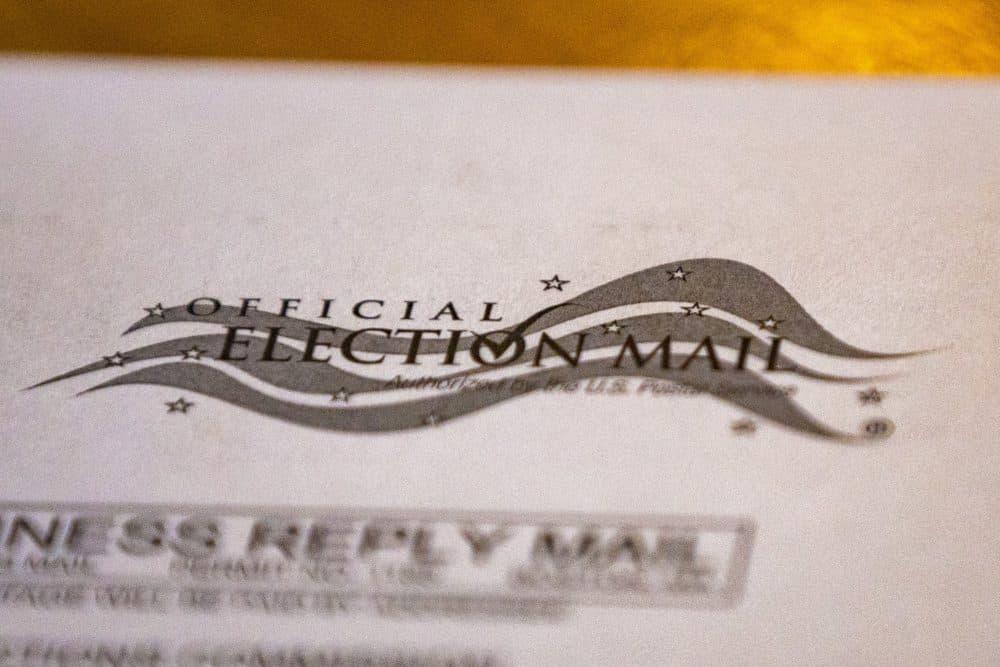Advertisement
Without Permanent Mail-In Voting Expansion, Old Rules Return For Mass. Summer Municipal Elections

Legislative leaders still have not outlined a plan to restore the now-expired authorization for expanded mail-in voting, prompting elections officials in several communities with contests this summer to remind voters that they can no longer submit a ballot by mail without a valid excuse.
After broadening ballot options and expanding early voting for more than a year in response to the pandemic, the Legislature allowed the provisions to lapse as the calendar flipped to Thursday in the face of renewed criticism from Secretary of State William Galvin and with the layout of several upcoming local races at stake.
Two town clerks whose towns have special elections in the next few weeks told the News Service they want Beacon Hill to make pandemic-era mail-in voting a permanent feature, calling it a popular method that voters in their communities embraced.
Fairhaven Acting Town Clerk Linda Fredette, who will oversee a July 26 election asking whether to recall and replace Select Board Chairman Dan Freitas, said she "definitely" saw an increase in turnout in recent elections when no-excuse vote-by-mail was an option.
"I wish that they would extend it forever because it was a great option," Fredette said. "Having it at their home where they can actually do research, to not be put on the spot to pick a candidate they're not sure of, and then dropping it off at their leisure — a lot of people really liked it and I liked that option, too."
With the policy expiring less than a month before Fairhaven's special election, Fredette said her office has received about 100 absentee ballot requests for voters who will be physically absent on the day that polls open, one of the reasons allowed under the traditional model that is once again in place.
In Somerset, which will host a special election on July 12 to fill a board of selectmen vacancy, the town clerk's office alerted voters — in a bolded and italicized message on its website — that if they completed an early vote-by-mail application, they must now fill out an absentee ballot application to comply with the traditional state elections law.
"We've publicized the fact that they can absentee vote as long as they meet one of the circumstances," said Somerset Assistant Town Clerk Kathleen Maiato. "We've had a good response to that. That's how we're proceeding."
Like Fredette in Fairhaven, Maiato said she believes state lawmakers should act swiftly to permit widespread vote-by-mail permanently.
"There should be universal use," Maiato said. "I think it should just be one type of voting, in fact, mail-in voting. I don't understand why they have to have all of this complicated absentee ballot. Just make it one. Mail-in, no excuse. It would be a whole lot easier and more cost-effective, one ballot, one envelope."
The House and Senate approved separate vote-by-mail plans, but lawmakers for weeks have been unable to reach agreement on extending the pandemic elections policy and on which elections should be covered by a permanent authorization.
Galvin, a fellow Democrat and the state's top elections official, has been prodding lawmakers to act quickly. He said Wednesday there is "good will" in both the House and the Senate, but warned that cities and towns with special elections this summer or municipal races this fall will need to shift their approach.
"What I want to stress is the importance of doing it as early as possible, not simply because we do have some elections in July, but it's more about letting the municipalities plan," Galvin told reporters. "They have to plan to make sure the ballots are available. They also have to make sure that the voters know what they have to do to get ballots."
Galvin urged lawmakers to extend the COVID vote-by-mail policy quickly and then circle back to a debate on permanent options later in the year. Gov. Charlie Baker has previously praised the success of mail-in voting.
If the Legislature waited even two or three weeks to revive mail-in voting, Galvin said, it would create a "significant" impact on cities and towns.
"We're less than 90 days away from the 14th of September, which is the largest date in the preliminary schedule," he said. "Municipalities need time to order the ballots. They need equipment, they need to get the word out to their voters."
In addition to Fairhaven and Somerset, at least four other towns — Gill, New Marlborough, Mattapoisett and Plymouth — have special elections in the next six weeks, according to Galvin's office.
More than 30 other municipalities have preliminary elections in September, Galvin said, including major races such as the Boston mayoral contest. Six candidates will face off in Boston's preliminary mayoral race on Sept. 14, when voters will narrow the field to two candidates for the Nov. 2 general election.
"That's going to have a larger turnout," Galvin said. "It's very important that these voters have the same rights as people who voted earlier this year."
Democrats who wield supermajorities in both branches are at odds over how to tackle voting policies and have not publicly communicated any plan to break the impasse.
The Senate voted to extend availability of no-excuse mail-in ballots and expanded early voting through Dec. 15 in a pandemic policy extensions bill, but the House did not and that provision remains before a private conference committee.
The House voted on June 10 to make mail-in voting a permanent option, but only in biennial state elections or primaries and municipal elections that fall on the same day, so that bill (H 3871) would not apply to this summer and fall's local races even if the Senate agreed to it.
SHNS' Chris Van Buskirk contributed reporting.